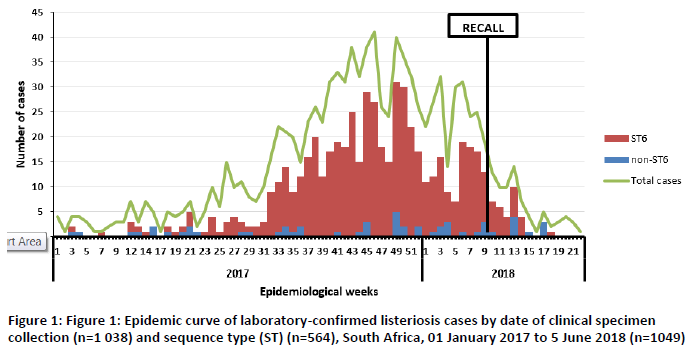Peter J Salama, Peter K Ben Embarek, Jayshree Bagaria and Ibrahima S Fall made the comments in medical journal, The Lancet.
Between January 2017 and early June this year there have been 1,049 laboratory-confirmed cases of listeriosis and 209 deaths.
By the end of 2017, the number of cases in South Africa was eight times higher than previous years.
Boosting surveillance
National and regional foodborne disease surveillance systems must be strengthened to detect and report cases in a timely way, said WHO experts.
“The food industry has a legal obligation and responsibility to have effective internal food safety systems and a process for tracing their products. In South Africa, initial assessment of the implicated factory and other factories closed because of positive Listeria findings have uncovered weaknesses in internal food safety controls.”
WHO, the Food and Agriculture Organization of the UN (FAO), United Nations Industrial Development Organisation (UNIDO) and partners are helping national governments review food safety regulations and standards and ensure robust implementation.
Size and duration of the event highlight the need for countries to invest in public health to prevent and quickly respond to foodborne outbreaks.
“For example, in March, 2018, an unrelated outbreak of listeriosis occurred in Australia, linked to consumption of melons. Rapid identification of the food source, prompt exchange of detailed export information, and genetic sequences through the INFOSAN network helped limit the public health and trade impact of the outbreak,” said Salama et al.
“Thanks to the sharing of genetic sequences, Singapore was able to link two of its listeriosis cases to the Australian outbreak.”
Changes take time
The South African Government response includes strengthening surveillance, updating the inspection system and enforcing regulatory changes, such as introduction of microbiological criteria and environmental monitoring programmes for Listeria that follow international standards.
“The profound changes being implemented will demand time and effort to be implemented fully. The food inspection system and its environmental health officers will require substantial training and upgrade of their skills. The RTE producing industry will require major investment in facility upgrades and training,” said Salama et al.
In a separate update, WHO said the outbreak has resulted in major changes to standard operating procedures around food safety and factory inspection and a review of legislation around processed meat products.
The country is looking at making HACCP mandatory in high-risk meat processing facilities.

Enterprise Foods’ Polokwane facility for polony (a local bologna) was identified as the outbreak source in early March 2018 and ready-to-eat processed meat products were recalled.
Destruction of recalled product is expected to be finalised by the end of June. As of 29 May 2,670 tons of recalled Enterprise and Snax products have been destroyed by thermal methods or landfill.
A total of 76 cases have been reported since 5 March and 52 interviewed.
Of these, 32 of 52 reported eating polony prior to illness onset; brands manufactured by Enterprise Foods were most commonly reported to have been consumed where brand was known.
For week ending 27 May two new confirmed listeriosis cases were reported compared to one the week before by culture and polymerase chain reaction (PCR).
A total of 590 clinical isolates have undergone WGS; 91% belong to the sequence type 6 (ST6) outbreak strain and the remainder are 16 different types.
WHO: Outbreak controlled; trade bans must be lifted
WHO is re-evaluating the risk with a view to reclassifying it and scaling down the grade of emergency.
“Although there are still a few new listeriosis cases and deaths since the implicated product recall in early March 2018, the South African authorities have largely brought this outbreak under control,” said the agency.
The National Health Laboratory Services Infection Control Services Laboratory (ICSL) started receiving environmental and food samples from production facility inspections for L. monocytogenes testing from mid-May.
Contaminated products were sent to 15 countries and distribution included domestic supermarket chains and local food markets making traceability and recall challenging, said the WHO experts.
“In spite of the comprehensive and effective response, and the transparency exhibited by the South African national authorities, some State Parties imposed trade bans on food products from South Africa, against WHO advice,” said the agency in the other update.
“Based on the current epidemiological situation, progress made in the implementation of new measures on food manufacturing and storage and adoption of new legislation, countries that are still continuing with bans on food products from South Africa should lift these bans.”
